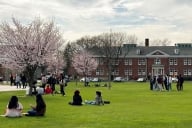You have /5 articles left.
Sign up for a free account or log in.
Compared to just a half-century ago, when they largely remained bastions of white Protestant men, America's most selective private and public colleges today look drastically different. Female students are a majority on many of the campuses, Catholics and Jews are well-represented, and black, Hispanic and American Indian students, while still not always evident in numbers proportional to their share of the overall American population, have made significant strides.
One group, though, remains in relatively short supply at elite institutions: students from low-income families. At a time when studies show that college graduates earn more than a million dollars more over the course of their careers than do people with no degrees, students from the nation's lowest economic quartile are six times less likely than their peers to qualify for the admissions pool of highly selective institutions.
That divide in educational opportunity is bad for the country both socially and economically, says William G. Bowen, president of the Andrew W. Mellon Foundation and co-author of Equity and Excellence in American Higher Education, published by the University of Virginia Press.
The long-term solution to that problem is to bolster the educational preparedness of those in the economic lower tiers through changes in national, state and other policies, but with the acknowledged flaws in the elementary and secondary systems, that could take a generation.
To begin to chip away at it now, Bowen and his co-authors argued Friday at a session at the Brookings Institution in Washington, selective colleges ought to the same sort of "thumb on the scale" in the admissions process for the lowest-income students that that they now give to children of alumni. (Right now, Bowen and his co-authors, Eugene M. Tobin and Martin A. Kurzweil, find, the 19 elite colleges in their study give no admissions edge to low-income students, unlike the advantage they give to alumni, athletes and underrepresented minority students.)
"We thought there'd be a certain symmetry to giving the most disadvantaged students the same admission advantage now given to the most advantaged students," said Kurzweil.
Doing so, the authors argued, would bring the proportion of students who are either from the lowest quartile of the American economic ladder or the first in their families to attend college up to about 17 percent of the student bodies of those elite institutions, up from the current 11 percent. There would be costs, the authors acknowledged -- particularly in terms of increased financial aid spending -- but the institutions can't afford not to. "Can they continue to rely on need-blind admissions? We think not," said Kurzweil.
The work of Bowen and his co-authors -- as well as similar work in recent years on the plight of low-income students by scholars like Gordon Winston at the Williams Project on the Financing of Higher Education and Thomas G. Mortensen of the Pell Institute for the Study Opportunity in Higher Education -- has undeniably increased the awareness of and pressure on colleges to open their doors to such students. Many colleges have altered their financial aid policies in the last five years to try to ease, if not eliminate, cost as a barrier to entry.
But sympathetic as they are to the problem, many college officials are wary of Bowen's proposed solution -- a point made eloquently and often at Friday's Brookings session by Amy Gutmann, president of the University of Pennsylvania, among others.
She acknowledged the "many strong arguments" for improving the status of students from the lowest income quartile: equalizing educational opportunity, diversifying the backgrounds of a college's students to ensure a diversity of perspectives in the classroom, and tapping the talents of people throughout American society for the economic marketplace.
But "all of the same arguments apply to students from the second and third quartiles, all of whom are highly underrepresented at our institutions," said Gutmann. Policies that awarded admissions preferences to low-income students, she warned, would "dis the middle class" and, potentially, foster the "same kind of resentment against low-income students as we now have against minority students."
"That is wrong as well as politically stupid," she said bluntly.
Gutmann also challenged the view that elite colleges are shunning low income students because they are focusing excessively on test scores and other by-the-numbers measures in the admissions process. "When you look at what the highly qualified candidates look like" -- world-class violinists, winners of national science competitions -- "we do find that the better educated kids from the higher income backgrounds tend to look better."
Despite those points of contention, the panelists and college officials in the audience had many more areas of agreement about ways in which colleges and policy makers might help more lower income students find a place in higher education.
Sanford J. Ungar, president of Goucher College, was among several people who condemned the obsession by private colleges and state lawmakers alike with merit-based rather than need-based financial aid, describing it as creating a "values crisis." Students from upper-income families have come to expect scholarships, and they and their parents may object to efforts to shift money to help needy students afford college.
David W. Breneman, dean of the Curry School of Education at the University of Virginia, described the challenges that the university has faced in getting lower-income students to take advantage of its new policy of expanded financial aid. "There are just insuperable barriers to getting young people to apply, much less to get financial forms filled out," he said.
He and others agreed that colleges and the federal government must do a much better job making sure middle and high school students are aware of the financial aid that is available to them. After Breneman talked up the GEAR UP and TRIO programs that help prepare disadvantaged young people for college, including by counseling them on affording college, Gutmann noted ironically that the Bush administration has proposed wiping out funds for both programs.









